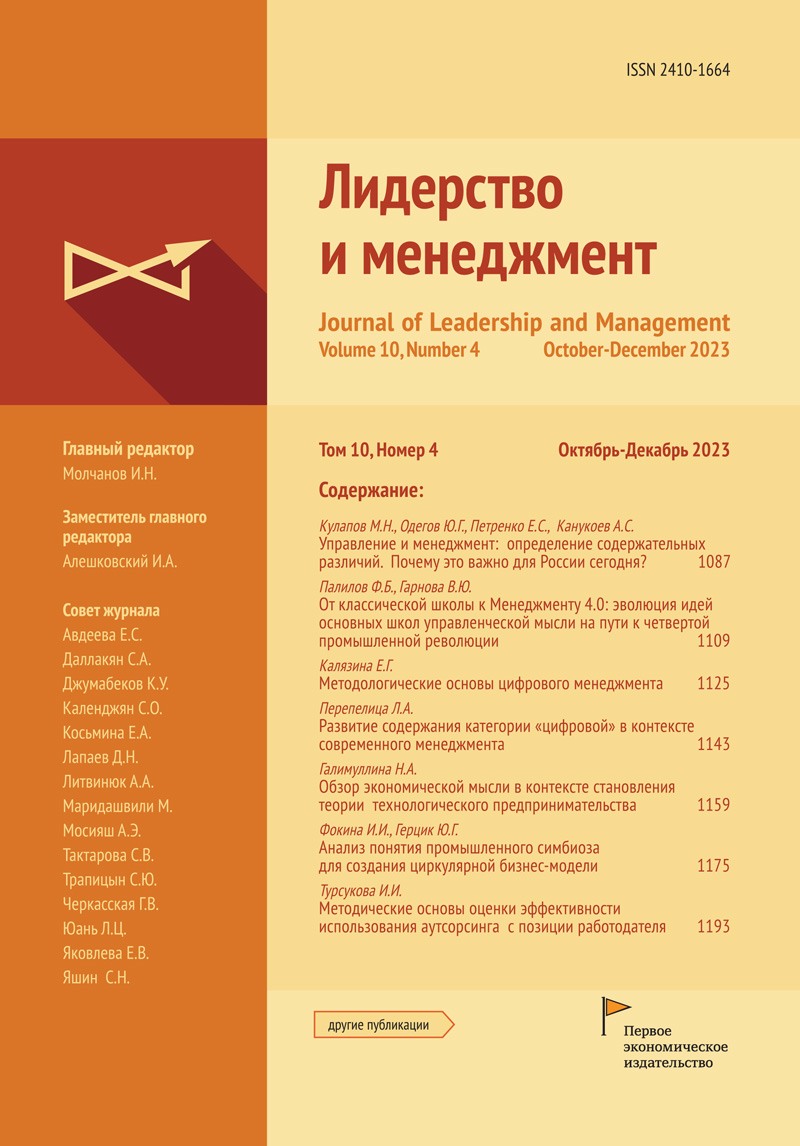Managing remote IT teams: current status and development trends
- Authors: Borodin G.V.1, Petrenko E.S.1
-
Affiliations:
- Plekhanov Russian University of Economics
- Issue: Vol 10, No 4 (2023)
- Pages: 1291-1302
- Section: Articles
- URL: https://journals.eco-vector.com/2410-1664/article/view/625259
- DOI: https://doi.org/10.18334/lim.10.4.119730
- ID: 625259
Cite item
Abstract
The presented article actualizes the problem of remote commands. The article is devoted to an overview of the formation of a remote workforce model, comprehension and generalization of the practices of domestic and foreign companies. Readiness for remote work is a new mandatory feature of the modern company. The authors pay special attention to the analysis of the factors that determined the evolution of remote teams, as well as conclusions about the advantages and disadvantages of the remote work. This is particularly important in the context of the transformation of employment in the post-pandemic period. The article will be of interest to specialists in the field of human resource management, personnel management, students, postgraduates and academic staff dealing with the problems of remote employment.
About the authors
Gordey Vadimovich Borodin
Plekhanov Russian University of Economics
Email: gordey.acc@gmail.com
Elena Stepanovna Petrenko
Plekhanov Russian University of Economics
Email: petrenko.es@rea.ru
References
- Иконников С.Д. Управление удаленными командами // Московский экономический журнал. – 2020. – № 9. – c. 30. – doi: 10.24411/2413-046X-2020-10606.
- Ковалёва И.А., Канке А.А., Мозговой А.И. Управление человеческими ресурсами через призму глобальных трансформационных изменений // Вестник МГПУ. Серия: «Экономика». – 2021. – № 1 (27). – c. 71-86. – doi: 10.25688/2312-6647.2021.27.1.6.
- Колесникова О.А., Донецкий А.М., Звездинская А.В. Дистанционная занятость в России: прогнозы и реальность // Вестник Воронежского института высоких технологий. – 2018. – № 1. – c. 138-142.
- Лаптева В.С. Эффективность коммуникаций в виртуальных командах проекта // Гуманитарное знание. – 2020. – c. 73-83.
- Малышева А.А. Анализ данных по удаленным рабочим местам в России и в зарубежных странах // Вестник Сибирского института бизнеса и информационных технологий. – 2019. – № 3. – c. 62-65.
- Организация удаленной работы в крупном российском бизнесе. Итоги 2020. [Электронный ресурс]. URL: Https://drive.google.com/file/d/1ubcnll-rgskjfla7b5hqnzrkv3g5j85c/view?pli=1 (дата обращения: 05.11.2023).
- Орлова М.В., Пшеничников В.О. Проектирование онлайн-системы управления малым бизнесом на основе функционально-ролевого моделирования // Менеджмент в России и за рубежом. – 2019. – № 4. – c. 95-100.
- Скавитин А.В. Удаленная занятость: обзор практик в России // Кадровик. – 2018. – № 3. – c. 102-107.
- Сущенко А.О., Портная А.Д. Актуальность дистанционного управления персоналом в современном мире // Образование и наука без границ: социально-гуманитарные науки. – 2021. – № 16. – c. 108-113.
- Табачникова М. Б., Чеснокова С. Е. Управление командами при реализации онлайн-проектов в условиях ограничений личного общения // Современная экономика: проблемы и решения. – 2020. – № 11. – c. 112-121. – doi: 10.17308/meps.2020.11/2469.
- Чекалкин С.А. Организация удаленной работы после пандемии // Инновации и инвестиции. – 2023. – № 8. – c. 415-424.
- Яхина Г.Р., Шакирова Д.М. Как мотивировать сотрудников в условиях удаленной работы // Теоретические и прикладные вопросы экономики, управления и образования: сборник статей II Международной научно-практической конференции, Пенза, 15-16 июня 2021 г. В 2-х т. - Т. 2 / под ред. Б. Н. Герасимова. - Пенза: Пензенский государственный аграрный университет. Пенза, 2021. – c. 309-311.
- The Complete Guide to Distributed Work for Enterprises. Lifesize. [Электронный ресурс]. URL: https://www.lifesize.com/en/distributed-work-hub/ (дата обращения: 05.11.2023).
- Marsh Ch., Forrest C., Castanon-Martinez R. Coronovirus will disrupt your workforce: ensure that you have the right tooling strategy for remote workers. 451 Research. [Электронный ресурс]. URL: https://go.451research.com/2020-mi-coronavirus-will-disrupt-your-business--remote-worker-tools-and-strategy.html (дата обращения: 05.11.2023).
- The Next Great Disruption is Hybrid Work - Are We Ready? Work Trend Index: 2021 Annual Report. Architectural Record. [Электронный ресурс]. URL: https://www.architecturalrecord.com/ext/resources/Issues/2021/07-July/Work-Trend-Index-2021-Annual-Report.pdf (дата обращения: 05.11.2023).
- Reiners B. 75+ Remote work statistics you should know. Built In. [Электронный ресурс]. URL: https://builtin.com/recruiting/remote-work-statistics (дата обращения: 05.11.2023).
- Smith D. Distributed work: Its future in the time of a pandemic. Lifesize. [Электронный ресурс]. URL: https://www.lifesize.com/en/blog/distributed-work-overview/ (дата обращения: 05.11.2023).
- State of Remote Work 2023. [Электронный ресурс]. URL: https://buffer.com/state-of-remote-work/2023 (дата обращения: 05.11.2023).
- 2022 State of Remote Work. [Электронный ресурс]. URL: https://buffer.com/state-of-remote-work/2022 (дата обращения: 05.11.2023).
- Wing Kosner A. The crucial difference between remote work and distributed work. Work in Progress. Dropbox Blog. [Электронный ресурс]. URL: https://blog.dropbox.com/topics/work-culture/the-crucial-difference-between-remote-work-and-distributed-work (дата обращения: 05.11.2023).
Supplementary files









